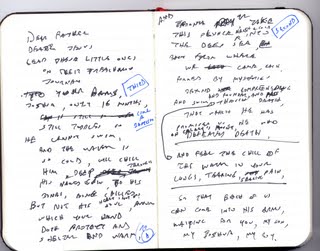
I've embarked on a new opera project, even though I was feeling like I was a bit fagged out after the difficulties of the last, but once again hath the candle singd the moath, and I find myself in familiar territory, exploring the viscous friction of sense and nonsense at the boundaries of religion. It all started when I ventured to see a bit of a new Deborah Slater piece at the Traveling Jewish Theater and watched some of my most favorite dancers move gorgeously across the stage. Later, outside, Lynne and Deborah and I were talking, the Medea story came up and Lynne asked if we remembered how, a few years back, a woman threw her three children in the bay. Of course we did and, for memory's sake, here is the news item:
A 23-year-old woman who said she was hearing voices stripped her three small children naked Wednesday and threw them off a San Francisco fishing pier into the bay, authorities said. - San Francisco Chronicle, October 20, 2005In fact, I remembered it very well, because Lynne and I happened across the makeshift memorial a few days after it occurred: flowers, stuffed animals, notes, photos, candles; all left in a vain attempt to palliate the horror of the crime. The story rolled around in my head for many days after that discussion, and I ended up buying a small notebook and some pens on a visit to Lynne's family
and I started writing something and had some very clear images of the look of it and that my dancer friends would be acting out the parts, maybe singers off stage, don't know, but when I started writing, I immediately mixed together the mother's thoughts and mine so that, in the end, there is definitely more of me than of her in it, but I started from the point that God and the mother really were talking and, like Abraham and Isaac, God really did tell her to kill her children, and that there is something compelling about her certainty, a religious certainty that many people crave. The text consists mostly of her internal monologue, but God speaks, and the children appear as well. She speaks like me, the version of me that graces many of these blog entries: a bit supercilious, a few too many five dollar words, but of course it really is me, my religious upbringing (although the mother was quite religious herself), my fascination with the non-rational, the ecstatic, my fear of insanity, my fear of a lack of ability to discern what is real and what is not.






